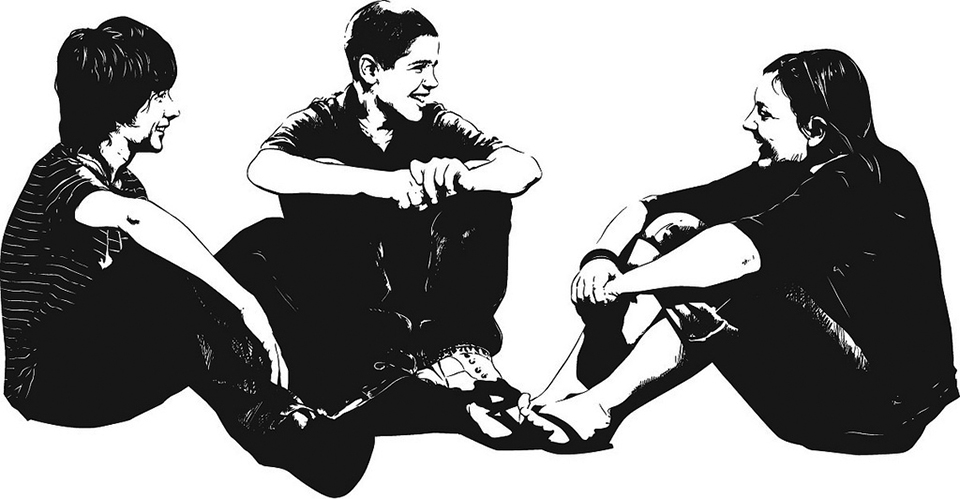
OR


Usha Pokharel
Usha Pokharel is an educationist and author of several children’s books.usha@pokharel.net
Teenagers are sometimes mischievous, but have you thought about it from their point of view? They may be trying to affirm their existence by thinking differently
Having a teenager at home is never simple. Understanding them is another challenge all together. While in the US, I heard quite a few frustrated parents say, ‘If men are from Mars and women from Venus, then teenagers must be from a galaxy far, far, away.’ I don’t think teenagers are that weird. Still sometimes parents get the impression that their child is purposely annoying them by being mischievous.
Yes, teenagers are sometimes mischievous, but have you thought about it from their point of view? It might be that they are just trying to affirm their existence by thinking differently. It is entirely possible that you still consider your teenager a child, but your teenager does not, and wants to make his/her own decisions. So problem arises when you try to make decisions for them and in an attempt to assert independence, they rebel. Instead if you trust your child’s judgment, even in small things, they will not feel the need to rebel. Just remember trusting your child goes a long way towards making them feel good about themselves and about you. You will realize that small things do make a big difference in establishing peace in your home.
Parents, understand that your children might also have an opinion. They feel good when you listen to their ideas, and discuss without downright rejecting it. This helps your child feel comfortable enough to eventually discuss their problems with you. Respecting their ideas without being judgmental will help bring your child close to you. That does not mean you have free reign on lecturing them. Just like us, they too stop listening when someone starts lecturing.
Appreciate them
Always keep in mind appreciation is good, but don’t overstep the boundary and say, ‘now that you are listening to me……’. That would be a recipe for immediate rebellion. Also remember not to talk negatively about their friends. It will only make your child dislike you more instead, and not their friend. Sometimes planting an idea in your child’s mind is better than dictating. Give them the satisfaction of making a decision themselves. Ah, then there is the question of your teenager dressing differently than normal.
I know you are dying to ask,‘why do they do that?’ Have you thought perhaps they are seeking your attention or trying to gain some recognition or even to assert some independence? And you fall into their trap, if you respond by being angry. Now your child knows what buttons to push to make you angry. So the best option is to just act normally. It is always a good idea to treat your teenager as an adult. Give them the opportunity to respect you by keeping calm and speaking kindly, even when you really don’t like what they are doing. It sure takes a lot of your patience and tactfulness to deal with your teenager.
Parents need to consider the fact that their children’s body is changing and that their hormones are not in their control. Chances are they are over stressed with all these changes and on top of that they might have problems at school. As a parent, it is our job to create a situation at home where they can talk about their problems. So instead of yelling at them for their messy room, propose to help clean up. They need support, not yelling, lectures or bossing around. They don’t need constant questioning. If you question less, they might share their views with you. It is always a good idea to have the communication lines open between you and your child. This will save your teenage child from becoming depressed.
Having said everything, you might still be wondering, ‘why are teenagers such moody, lazy, selfish nightmares?’ First of all, parents need to understand that teenage brain is still under construction. This development continues from birth till a person reaches mid twenties. So you see teenage years are a period when intense neural development takes place. This is also the time when new neural pathways are formed and the existing ones are filtered of the ones that are no longer needed to make the brain faster and more efficient.
Now that I have got you into teenager’s brain development, let me tell you, this development starts at the base of the brain, very close to the spinal chord and moves to the front and the top. The final development happens in the prefrontal cortex, responsible for impulse control and decision-making. When the prefrontal and frontal lobes are not joined, a teenager has difficulty in moderating their behavior and reasonable decision-making. I know some of you are thinking, ‘why do teenagers not sleep in time?’ I know most parents want their teenager to sleep in time like others do. Parents, teenagers are different. Don’t be shocked.
Although teenagers need plenty of sleep, they don’t get it. When children become teenagers, their sleep pattern changes. When puberty hits, melatonin (a sleep agent) is released later in the night, around 9:00 pm or 10:00 pm. As a result teens do not get to sleep before 11:00 pm. On top of that, the sorting of nerves generally takes place during the night time especially after midnight, during early morning. As a result, teens will sleep late and would want to sleep in, in the morning. So when you wake them up at 8:00 am they are sleep deprived. If they do not get enough sleep, their performance in school suffers. Considering this fact some schools in the US have changed their school time in the morning, letting students to get enough sleep.
Think of it
Contrary to the belief that once children are physically mature, they have an adult brain, a teenage brain is only 80 percent developed, by the end of their teenage years. You will be surprised to know that their brain is fully mature only when they are in their mid 20s. Oh yes, teenagers are also untidy. You need to understand that tidiness requires sophisticated level of cognitive control. They are also not good at planning. These are the result of the way teenage brain is connected. The frontal and pre-frontal lobes are the last to connect.
Now you may be thinking what exactly are frontal and pre-frontal lobes. The frontal lobes are involved in motor function, problem solving, spontaneity, memory, language, initiation, judgment, impulse control, and social and sexual behavior. While the prefrontal lobes control concentration, emotion, insight, empathy and risk taking and other higher brain functions. These abilities are still under development in the teenager. That is also the reason for very smart adolescents to sometimes do very stupid things in a very impulsive way. At the same time organization is not a high priority for most teenagers.
As a result of a still developing brain, teenagers have emotional highs and lows, because the emotional centers of the brain are connected before the frontal lobes. So the emotional centers become active but the frontal lobes are not developed enough to control the emotions. Teenagers are known to make lots of mistakes. They are living their life and learning, as they grow older. Hence there is a lot of trial and error in an effort to be original. At the same time they are also seeking their identity. Teenagers are not good at identifying what cause will lead to which effect. Thus they are vulnerable and are easily influenced by both good and bad things.
Parents are sometimes frustrated with their teenagers’ behavior and easily give up. Just because your child has become a teenager, does not mean you have to put in less energy in caring for them. Actually they require more care. You have to help them plan and understand their strengths and weaknesses. Talk to them about decision-making.
As a parent, you have to step up and provide as much help as possible to your teenage child. Avoid the thought of “oh, they’ll be fine. They will bounce back. They will grow out of it.” Yes, they will grow out of it, but how and what they will become is all up to you. Just remember it’s an incredibly valuable and precious time. It’s a time you can provide help to your child to grow up to secure a good future. Parents as well as teenagers need to know that. After all, your child has only one brain. Now that is not too difficult to understand, right parents?
Pokharel is an educationist and author of several children’s books
usha@pokharel.net
You May Like This

China, Japan, and Trump’s America
It is difficult to remember that a little over two decades ago, many Americans feared being overtaken by Japan, not... Read More...

No country for new leaders
Obama became the US president 13 years after Deuba became Nepal’s prime minister in 1995. When Jhalanath Khanal became UML’s... Read More...

Why privacy bill should be amended
The state has no right to control people’s freedom and liberties while introducing right to privacy laws. No law should... Read More...





Just In
- CM Kandel requests Finance Minister Pun to put Karnali province in priority in upcoming budget
- Australia reduces TR visa age limit and duration as it implements stricter regulations for foreign students
- Govt aims to surpass Rs 10 trillion GDP mark in next five years
- Govt appoints 77 Liaison Officers for mountain climbing management for spring season
- EC decides to permit public vehicles to operate freely on day of by-election
- Fugitive arrested after 26 years
- Indian Potash Ltd secures contract to bring 30,000 tons of urea within 107 days
- CAN adds four players to squad for T20 series against West Indies 'A'













Leave A Comment